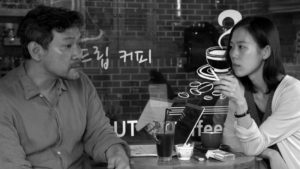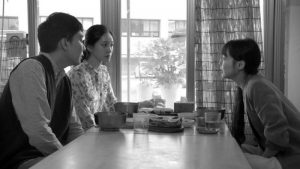QUICK SNAP: LIVE FROM BERLIN!
A tale of two performances: Noémie Merlant as Céline, fresh off A Portrait of a Lady on Fire (Céline Sciamma, 2019) and Jumbo (Zoé Wittock, 2020) with a credible, affecting portrait of trauma denial; and Nahuel Pérez Biscayart as Ramon, suffering severe panic attacks right from the start without enough depth to properly pull it off. A tale of a couple, navigating the aftermath of the 2015 Bataclan attacks together, with the finer and cleverer performance being dragged down by a messy one.
One Year, One Night is based on the true recollections of two French-Spanish couples who went through unimaginable horror when escaping from the horrific terrorist attack, where 130 people were brutally killed by Islamist terrorists. Using a back-and-forth narrative technique, starting in the aftermath before giving us piecemeal cutbacks to the attacks themselves — tastefully shot so as to avoid any depiction of the gunmen — the result is a touching portrait of trauma and the pains of trying to live within its shadow.
The film works best when explaining the ways that life goes on even when you have suffered a severe event, with Ramon and Céline going back to their jobs; Ramon is in some kind of financial services while Céline is a social worker at a foster home, mostly working with Black and brown kids. With a manner reminiscent of Jean-Marc Vallée, edits come through these scenes like intrusive thoughts, showing us the difficulty of trying to move forward. But while Céline’s arc, telling no one what happened and hoping the negative feeling just goes away, seems more fascinating, Ramon’s everything-on-the-table reaction, vacillating between grief and encounter and moments of strange enlightenment, required subtler execution from Biscayart, who can’t quite pull it off.
Naturally, their relationship, told over the course of a year, comes under great scrutiny, whether they have drunk too many beers in Spain, stressed from work, or try and plan the future together. At times the attack itself fades from view and we are left with a handsome-enough relationship drama. But the dramatic line of the film is left severely wanting, with little shape given to each character’s development or conflict: arguments in rooms and cool dancing scenes can be fun, but they have to actually mean something; instead it just feels like padding.
And at 130 minutes, what could’ve been a neat Panorama film is given the bloated self-importance of a competition entry. While the experiences of the Bataclan survivors deserves a fair telling — with their input and consent, of course — One Year, One Night doesn’t live up to the importance of the task.
One Year, One Night plays in competition at the Berlin Film Festival, running from 10-20th February.










